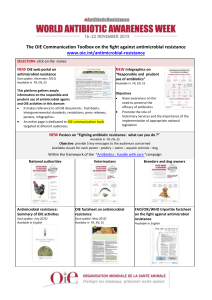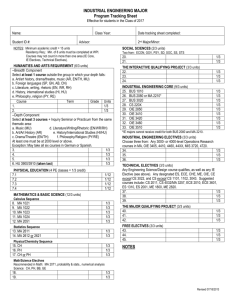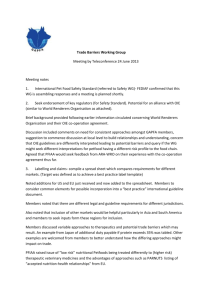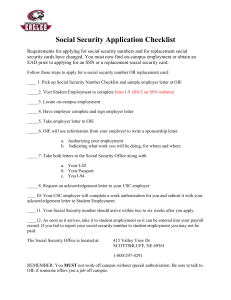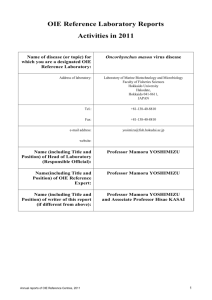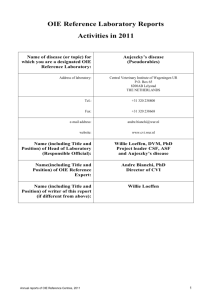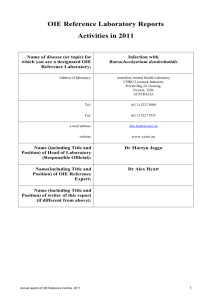Disease name
advertisement
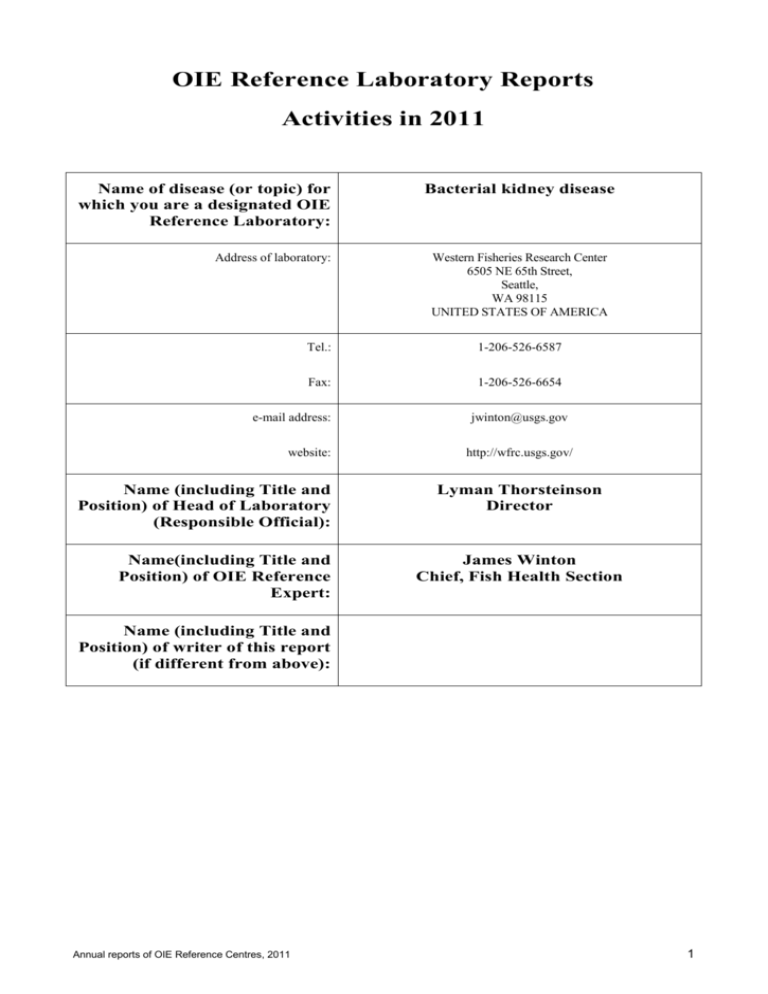
OIE Reference Laboratory Reports Activities in 2011 Name of disease (or topic) for which you are a designated OIE Reference Laboratory: Address of laboratory: Bacterial kidney disease Western Fisheries Research Center 6505 NE 65th Street, Seattle, WA 98115 UNITED STATES OF AMERICA Tel.: 1-206-526-6587 Fax: 1-206-526-6654 e-mail address: website: Name (including Title and Position) of Head of Laboratory (Responsible Official): Name(including Title and Position) of OIE Reference Expert: jwinton@usgs.gov http://wfrc.usgs.gov/ Lyman Thorsteinson Director James Winton Chief, Fish Health Section Name (including Title and Position) of writer of this report (if different from above): Annual reports of OIE Reference Centres, 2011 1 Bacterial kidney disease Part I: Summary of general activities related to the disease 1. Test(s) in use/or available for the specified disease/topic at your laboratory 2. Bacterial isolation on KDM-2 or SKDM growth medium. Diagnosis/research. 187 cases. Identification via the fluorescent antibody test (FAT) using polyclonal and monoclonal antisera. Diagnosis/research, 350 cases. Identification via the polymerase chain reaction (PCR). Diagnosis/research, 660 cases. Identification via the enzyme-linked immunosorbent assay (ELISA). Diagnosis/research, 425 cases Identification via the quantitative (real-time) PCR. Diagnosis/research. 367 cases. Production and distribution of diagnostic reagents Testing of monoclonal antibodies to bacterial antigens, and to fish immunoglobulin. Testing of polyclonal antiserum to Renibacterium salmoninarum. Testing and distribution of oligonucleotide primers for the (PCR). Testing and distribution of quantitative PCR standards (extracted R. salmoninarum DNA) Part II: Activities specifically related to the mandate of OIE Reference Laboratories 3. International harmonisation and standardisation of methods for diagnostic testing or the production and testing of vaccines 4. a) Establishment and maintenance of a network with other OIE Reference Laboratories designated for the same pathogen or disease and organisation of regular inter-laboratory proficiency testing to ensure comparability of results b) Organisation of inter-laboratory proficiency testing with laboratories other than OIE Reference Laboratories for the same pathogens and diseases to ensure equivalence of results Preparation and supply of international reference standards for diagnostic tests or vaccines 5. Testing and distribution of oligonucleotide primers for the PCR (5 cases). Testing of polyclonal antiserum for the enzyme-linked immunosorbent assay (0 cases) Testing and distribution of bacterial antigen for the enzyme-linked immunosorbent assay (5 cases). Research and development of new procedures for diagnosis and control 2 Prepared revised BKD chapter for OIE Diagnostic Manual for Aquatic Animal Diseases. Reviewed bacteriology portion of new version of the American Fisheries Society "Bluebook" diagnostic manual for aquatic animal diseases for use by US entities. Invited member of task force for development of national aquatic animal health program for US. Development of new PCR primer sets for R. salmoninarum Investigations into the transmission of R. salmoninarum during fish marking Investigations into aquaculture practices and the transmission of R. salmoninarum Development of assays to measure the immune functions of salmonids Investigations of the effects of dietary factors on the immune response of salmonids DNA vaccine studies in fish for control of BKD by genetic immunization Quantitative PCR assays to detect cytokine responses to R. salmoninarum Microarray assays to detect expression of host genes in response to R. salmoninarum infections Annual reports of OIE Reference Centres, 2011 Bacterial kidney disease 6. Comparison of non-culture methods of R. salmoninarum detection (PCR, FAT, ELISA) with culture for validation studies Development of non-lethal sampling methods for detection of R. salmoninarum in juvenile salmonids Collection, analysis and dissemination of epizootiological data relevant to international disease control 7. Provide data and professional advice to US Dept of Agriculture for OIE Annual Report. Maintenance of a system of quality assurance, biosafety and biosecurity relevant to the pathogen and the disease concerned The WFRC represents a state-of-the-art center for work on infectious diseases of fish that includes over 16,000 square feet of laboratory space for virology, bacteriology, immunology, histology, parasitology, and molecular biology. The laboratory also houses a 9,000 square foot wet laboratory supplied with pathogen-free, temperaturecontrolled (5-25C) fresh water to a total of more than 300 tanks of various sizes. The laboratory effluent is treated with chlorine gas. Within the dry lab is a restricted access Biosafety Level 3 laboratory containing dry and wet laboratories for work with exotic fish pathogens. 8. Provision of consultant expertise to OIE or to OIE Member Countries 9. Provided advice to laboratory in Mexico Provision of scientific and technical training to personnel from other OIE Member Countries None. 10. Provision of diagnostic testing facilities to other OIE Member Countries None. 11. Organisation of international scientific meetings on behalf of OIE or other international bodies None. 12. Participation in international scientific collaborative studies None. 13. Publication and dissemination of information relevant to the work of OIE (including list of scientific publications, internet publishing activities, presentations at international conferences) Scientific publications in peer-reviewed journals Elliott, D., S. Viljamaa-Dirks, H. Schmidt-Posthaus and C. Conway (2011) Normal (but unusual) lymphoid tissue of sturgeon. European Association of Fish Pathologists Histopathology Workshop Proceedings: Lymphoid and musculoskeletal histopathology. ISBN 0-9546666-6-6 Marsh, D.M., W.D. Muir, B.P. Sandford, D. Elliott, L.M. Applegate, C. McKibben, S. Mosterd, S. Badil and J. Woodson (2010) Alternative barging strategies to improve survival of transported juvenile salmonids-2008. Fish Ecology Division, Northwest Fisheries Science Center, National Marine Fisheries Service, Seattle, WA. Metzger, D.C., D.G. Elliott, A. Wargo, L.K. Park and M.K. Purcell (2010) Pathological and immunological Annual reports of OIE Reference Centres, 2011 3 Bacterial kidney disease responses associated with differential survival of Chinook salmon following Renibacterium salmoninarum challenge. Dis. Aquat. Org. 90:31-41. Munson, A.D., D.G. Elliott and K. Johnson (2010) Management of bacterial kidney disease in Chinook salmon hatcheries based on broodstock testing by enzyme-linked immunosorbent assay: A multiyear study. North Amer. J. Fish. Mgmt. 30:940-955. Purcell, M.K., G. R. Getchell, C.A. McClure and K.A. Garver (2011) Quantitative polymerase chain reaction (PCR) for detection of aquatic animal pathogens in a diagnostic laboratory setting. J. Aquat. Anim. Health 23:148161. _______________ 4 Annual reports of OIE Reference Centres, 2011
